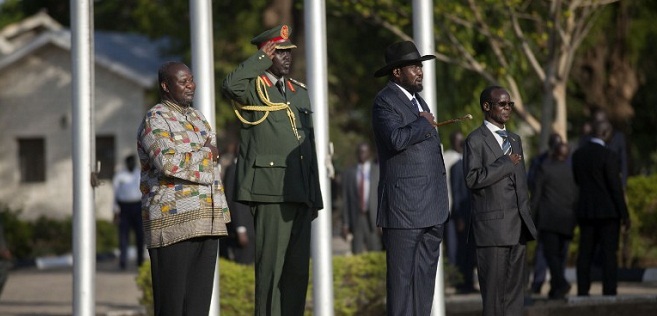
Juba, South Sudan | AFP |
South Sudan has been plunged back into violence as it marks five years of independence, with a peace deal stalled and huge swathes of the country facing food shortages.
Tens of thousands have died in the war that started in December 2013 in the world’s youngest nation.
Here are key challenges facing the country.
Fighting
Violence ahead of the fifth anniversary of the country’s independence Saturday left as many as 150 fighters dead following clashes between government soldiers and former rebels.
They were the first battles in the capital Juba since the conclusion of the comprehensive peace deal between the two sides — government soldiers loyal to President Salva Kiir and former rebels loyal to Vice-President Riek Machar.
Heavy fighting erupted again in Juba on Sunday as former rebels and government soldiers once again exchanged fire although the extent of casualties was not immediately clear.
Peace process stalled
In a statement the UN Security Council said the recent fighting showed a “lack of serious commitment” to peace on the part of Kiir, Machar and their supporters.
Last year Kiir ordered the number of regional states be nearly tripled to 28, undermining a fundamental pillar of the power-sharing deal.
Ceasefire monitoring teams have meanwhile been repeatedly blocked from accessing key areas.
Famine warnings
Nearly five million people — more than ever before — need food aid to survive, the UN has warned.
Over two million people have been forced from their homes since the war began, with over 700,000 fleeing as refugees to neighbouring nations.
A report by the Integrated Food Security Phase Classification (IPC) organisation singled out areas of Unity and Bahr el Ghazal states as hardest hit.
According to the IPC analysis, conditions in some areas have already reached the most severe category of “catastrophe” or “phase five”. However the technical term “famine” is not declared until those conditions are faced by one fifth of the population.
Economic collapse
South Sudan is struggling with soaring inflation caused by the war, rampant corruption and the near collapse of the oil industry upon which the vast proportion of government foreign exchange earnings depend.
The International Monetary Fund (IMF) has warned the economy is in ruins with inflation at almost 300 percent and the currency slumping by 90 percent this year.
Central bank international reserves to cover imports “have dwindled to a few days” the IMF said this month, with the government’s deficit expected to top $1.1 billion (999 million euros) this year, some 25 percent of GDP.
****
editor@independent.co.ug
 The Independent Uganda: You get the Truth we Pay the Price
The Independent Uganda: You get the Truth we Pay the Price


